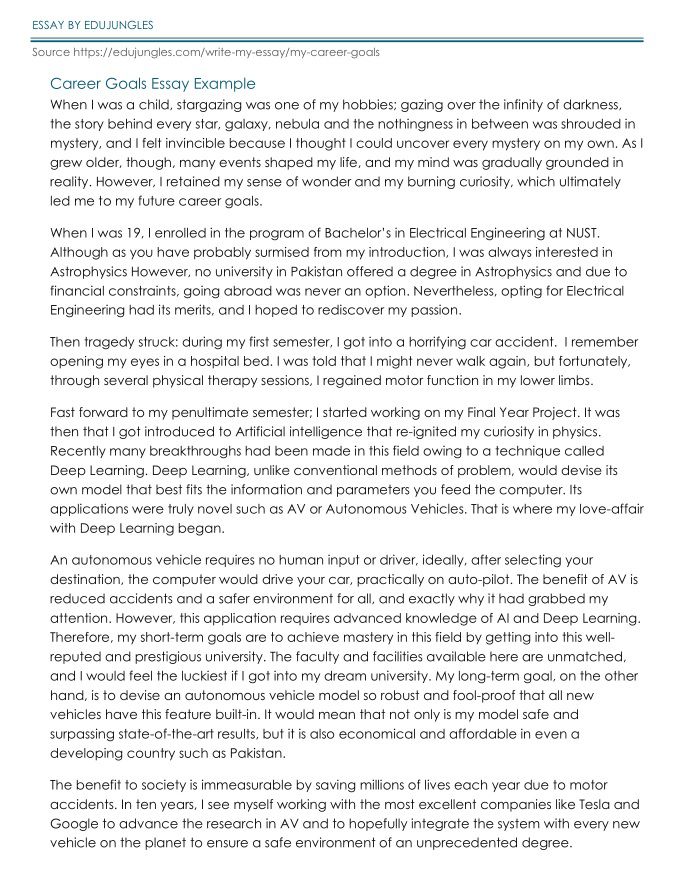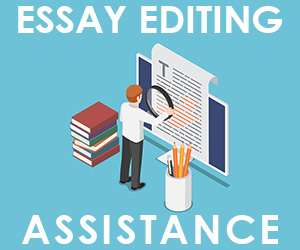
This portion should start with a thesis statement and should contain your short-term and long-term career goals. Also, your achievements relevant to the field of interest. It can also include the events that led you to this path as well as how you aim to achieve these goals.
Before penning down the essay, you should have a clear structure in your mind. It allows the reader to follow your thought process and emotions. You do not want the reader to fall victim to ambiguity and misleading ideas. It will help you write a cohesive essay about your career.
Writing an essay on career goals is significant for you. Not only is it a requirement to write a career goal essay for college and applying for university, but this is a classic piece of writing demanded in job interviews as well. You need to master the skill of drafting your essay on career goals and aspirations in a way that it impresses the intended audience. This article will guide you through the process step by step and provide you with career goal essay examples.
The benefit to society is immeasurable by saving millions of lives each year due to motor accidents. In ten years, I see myself working with the most excellent companies like Tesla and Google to advance the research in AV and to hopefully integrate the system with every new vehicle on the planet to ensure a safe environment of an unprecedented degree.
Short Term Career Goals

Since my childhood, I wanted to make a difference in the world. This emotion translated into my new career goal. I aim to start a social enterprise. My plan of action includes getting my degree from your university which is the best fashion designing institute and starting a designer shoe business. With every sale of a pair, I plan to donate one to the needy.
These are aims you want to achieve further in the future. These usually take more than 1 year. A few examples of such long-term career goals include:
After graduation, I hope to start a cause-driven business and will serve the community. I want to work on my passion and become successful. All of this can be achieved if I get a chance to learn from your capable faculty under the prestigious name of your university.
Buy pre-written essays about your best friend, career goals, and whatnot. Sites such as EssayZoo offer the best off-the-shelf essays you can get your hands on. It helps you save time and offers you one of the finest work out there.
![]()
Outstanding career goals essays don’t simply list what the applicants have done and what they want to do
Choose among the experiences you have had, either at work or through a community or extracurricular activity, that will showcase your leadership, creative thinking, and collaborative abilities.
In our How to Write Exemplary Application Essays blog series, you’ll learn how to create exemplary essays by analyzing sample successful application essays.
By Judy Gruen, former Accepted admissions consultant. Judy holds a Master’s in Journalism from Northwestern University. She is the co-author of Accepted’s first full-length book, MBA Admission for Smarties: The No-Nonsense Guide to Acceptance at Top Business Schools . Want an admissions expert help you get accepted? Click here to get in touch!
Your career goals essay isn’t a list or CV
![]()
She establishes her theme in this opening, and then gives the context for her MBA goal. Notice that in writing about her work as an accountant for a major firm, she provides relevant details, including how many years she has been in this field, her bilingual abilities, and specialty area as an auditor. This is the springboard from which she explains why she is pursuing the MBA – her role as an accountant is too limited for her to achieve her career goals as a money manager.
Ideally, the material you choose to include in your career goals essay will also allow you to demonstrate your knowledge about industry trends, and point to how your particular abilities can help make a contribution to that field.
Some career goals essays also ask why you have chosen that particular school. If you are faced with such a question, make sure to leave enough room to write knowledgeably and enthusiastically about that specific program. This will be easier if you have made campus visits, attended student recruitment meetings, participated in forums, read school blogs, communicated with current students or recent alumni, and otherwise familiarized yourself with the program and the courses and specializations it offers that are relevant to your goals.
• Why MBA, a free guide to help you determine your MBA goals
• 7 Signs an Experience Belongs in Your Application, a short video
• Focus on Fit, a podcast episode

- What is something I’m passionate about?
- What is one thought or idea I want to share?
- Is there any misconception I want to correct?
- What is the best way to present this topic of information (with regard to the types of essays)?
One common structure for an essay is the Five-Paragraph Essay, with the following parts:
When editing, pay attention to the words you use: remove all unnecessary words and work on using strong verbs in place of weak ones.
- Introduction with thesis statement
- Main Point #1
- Main Point #2
- Main Point #3
- Conclusion
1. Decide on your essay type and topic.
If your topic calls for it and if time allows, you may want to consider conducting quick interviews with experts on the subject. These will serve as a primary source for your essay.
But really, an outline can help you organize your thoughts before you start writing and actually save you time, since you’ll avoid beating around the bush or jumping from one idea to another without a clear direction.
Although this structure is made up of five paragraphs, we can easily use the same model and make it into a Five-Part Essay Structure. This means that we will stay within the pattern, but each main point may have more than one paragraph.

Generally, the thesis statement will present your main topic while also expressing what position you hold regarding the subject.
Essays can come in many different forms. The most common types include the following:
After you have brainstormed and researched, write down your thesis statement. A thesis statement consists of one or two sentences that sum up the primary subject or argument of your essay.
You can use the Mind Map method to brainstorm connecting ideas, or you can also just jot down bullet points as you encounter them in your research.
3. Develop your thesis statement.
Using your outline, you can now begin writing your essay. Some writers choose to write their paragraphs in order, beginning with the hook. The hook is the first few lines in your essay that will grab the readers’ attention.
Once you have your thesis statement, you can start to prepare your outline. Many people skip the outline process, thinking it’s a waste of time.
After you write your first draft, refine and proofread your work to make sure you fix all grammatical and spelling errors. You can use a tool like Grammarly when you do this to have fresh “eyes” looking at your work, but don’t rely solely on software—always review your work at least once yourself or have another (human) do it!

When I was twelve years old, a drunk driver hit the car my mother was driving while I was in the backseat. I have very few memories of the accident, but I do faintly recall a serious but calming face as I was gently lifted out of the car. The paramedic held my hand as we traveled to the hospital. I was in the hospital for several weeks and that same paramedic came to visit me almost every day. During my stay, I also got to know the various doctors and nurses in the hospital on a personal level. I remember feeling anxiety about my condition, but not sadness or even fear. It seemed to me that those around me, particularly my family, were more fearful of what might happen to me than I was. I don’t believe it was innocence or ignorance, but rather a trust in the abilities of my doctors. It was as if my doctors and I had a silent bond. Now that I’m older I fear death and sickness in a more intense way than I remember experiencing it as a child. My experience as a child sparked a keen interest in how we approach pediatric care, especially as it relates to our psychological and emotional support of children facing serious medical conditions. It was here that I experienced first-hand the power and compassion of medicine, not only in healing but also in bringing unlikely individuals together, such as adults and children, in uncommon yet profound ways. And it was here that I began to take seriously the possibility of becoming a pediatric surgeon.
The roots of my desire to become a physician are, thankfully, not around the bedside of a sick family member or in a hospital, but rather on a 10-acre plot of land outside of a small town in Northwest Arkansas. I loved raising and exhibiting cattle, so every morning before the bus arrived at 7 a.m. I was in the barn feeding, checking cattle for any health issues and washing the show heifers. These early mornings and my experiences on a farm not only taught me the value of hard work, but ignited my interest in the body, albeit bovine at the time. It was by a working chute that I learned the functions of reproductive hormones as we utilized them for assisted reproduction and artificial insemination
If you had told me ten years ago that I would be writing this essay and planning for yet another ten years into the future, part of me would have been surprised. I am a planner and a maker of to-do lists, and it has always been my plan to follow in the steps of my father and become a physician. This plan was derailed when I was called to active duty to serve in Iraq as part of the War on Terror.
Further experiences in medicine throughout and after college shaped a desire to practice in underserved areas. While coloring and reading with children in the patient area at a Family Health Center, I witnessed family medicine physicians diligently serve patients from low-income communities. On a medical/dental mission trip to the Philippines, I partnered with local doctors to serve and distribute medical supplies to rural schools and communities. At one impoverished village, I held a malnourished two-year old boy suffering from cerebral palsy and cardiorespiratory disease. His family could not afford to take him to the nearest pediatrician, a few hours away by car, for treatment. Overwhelmed, I cried as we left the village. Many people were suffering through pain and disease due to limited access to medicine. But this is not rare
Medical School Essay One
In short, I see the role of physicians in society as multifunctional: they are not only doctors who heal, they are also leaders, innovators, social scientists, and patriots. Although my path to medical school has not always been the most direct, my varied and circuitous journey has given me a set of skills and experiences that many otherwise qualified applicants lack. I have no doubt that the next ten years will be similarly unpredictable, but I can assure you that no matter what obstacles I face, my goal will remain the same. I sincerely hope to begin the next phase of my journey at Brown University. Thank you for your kind attention.
Facing the realities of disease and death daily from an early age, I developed a strong sense of pragmatism out of necessity. There is no place for abstractions or euphemisms about life and death when treating a calf’s pneumonia in the pouring rain during winter. Witnessing the sometimes harsh realities of life on a farm did not instill within me an attitude of jaded inevitability of death. Instead, it germinated a responsibility to protect life to the best of my abilities, cure what ailments I can and alleviate as much suffering as possible while recognizing that sometimes nothing can be done.
As for my geographic origin, I was born and raised in the rural state of Maine. Since graduating from college, I have been living in my home state, working and giving back to the community that has given me so much. I could not be happier here
